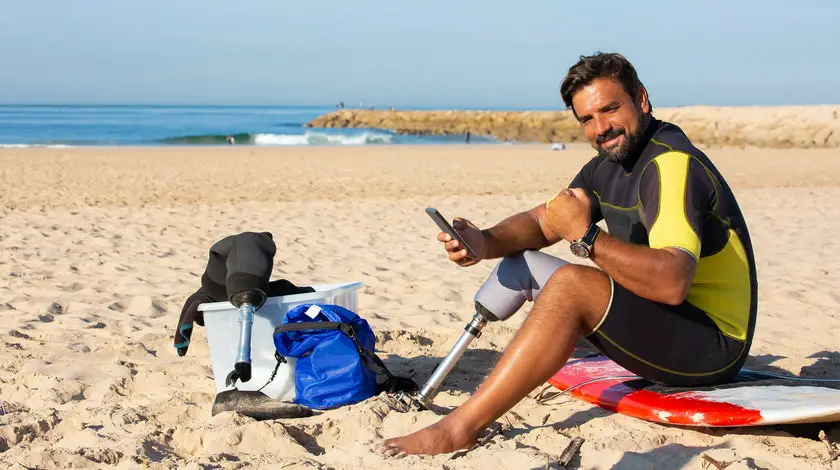Summertime often presents the perfect moment to take a trip to the beach.
You can blame this craving on the sweet, warm, and sunny atmosphere. It’s the best time to relax and unwind with family and friends as you have fun on the shores of the beach.
For an amputee, engaging in any of these activities might be quite challenging.
Your use of prosthetics or mobility aid could make movement on the beach a bit daunting.
But you don’t have to fret about that anymore because I’ve got every piece of information that will help to ease your visit to the beach, in this article.
Keep reading to get enlightened about everything you need to know when visiting the beach as an amputee.
Table of Contents
- Things to Know When Going to the Beach as an Amputee
- Safety Tips for Going to the Beach as an Amputee
Things to Know When Going to the Beach as an Amputee
There are several factors to put into consideration. Below are some of them.
Going alone
Sometimes you might want to enjoy the serenity of the beach alone, which is quite normal.
If you must visit the beach alone, avoid going into the water on your own whether you’re with or without your prosthetics.
Also, avoid anything that will result in swelling or discomfort that might cause you to want to seek help.
Going in the company of friends or family can be delightful and allows you to have more fun.
You can enter the water and rest assured that there is always someone to provide support and help whenever you need it.
Related: Top 6 Disability Awareness Event Ideas
Exposure to water

During summer, you want to soak your body in the ocean while the sunshine is on your face. It is pretty typical; everyone feels this way.
The splashing sprinkler brings you joy as a kid; why won’t the beach have the same effect now that you are all grown up?
However, don’t let the excitement carry you away. Always ensure that your prosthetic or mobility aid is one of your primary concerns.
The type of prosthetic you own will determine its compatibility with water.
Water is a polar substance and it can react with several matters. It can induce rust, which causes hindrance in the fluid movement of the mechanical parts.
Subjecting your prosthetic to water, if the manufacturers have clearly stated that it is not waterproof, can also cut off whatever manufacturer’s warranty that’s attached to it.
Therefore, if you would love to spend time in the water but don’t have a waterproof prosthetic, it is best not to go into the water with your prosthetic.
This will help to reduce subjecting your body part, which will usually be attached to the prosthetic, to undue pressure and stress.
Cases of swelling
This is one primary concern of every amputee. Heat and stress are significant factors that can cause an amputee to experience swelling.
If you intend to spend some time on the beach, it is best to have visited the hospital to see your prosthetist. Share your summer plan(s) and ask for suggestions on how to handle the outdoor temperature.
You can reduce stress by reducing movements and accessing areas of the beach that will not require much activity.
Avoid dunes, parking lots that are far from the beach, rocky terrains, bushy or busy paths, fluffy or loosely held sands, longer stairs, and other things or places that can induce pressure.
Also, you can try to go out without prosthetics and enjoy your summer without restriction. It will equally help to reduce all forms of discomfort.
Related: 11 Benefits of Being an Amputee
Exposure to fine sand particles
You can agree that sand, especially when it is fine and in large quantity, can be challenging to walk, as it is on the beach.
Considering your prosthetics and materials, navigating this mass of fine sand can be arduous.
You might want to consider getting a walking stick or hiking stick when going to the beach.
It will provide you with comfort and more balance when navigating the sand mass by directly contacting the ground. This will prevent you from being disturbed by sand stopping you from enjoying the beach.

In addition, the fine-grained sand on the beach can get inside the prosthetic, causing friction between the moving parts. This may result in damage and reduce the prosthetic’s efficiency.
Therefore, it is vital to cover all prosthetics and avoid direct exposure to sand. You may wear long covering socks with rain boots or long-sleeved beach attire to cover every part appropriately.
The rain boot can also help to prevent water from getting into your prosthetics while guaranteeing you double protection.
Effects of sweat
The extreme temperature can induce sweating, which is uncomfortable and can cause the slipping and chafing of your prosthetics.
It can also cause discomfort and pain to you as an amputee.
You can prevent this by simply visiting your prosthetist before the summer period. The prosthetist will make minor adjustments to your prosthetics because most sweats are induced by swelling.
So, don’t hide your summer plan from your prosthetist, or you might ruin your summer.
Staying hydrated
After your prosthetist must have made the relevant adjustments to your prosthetics, consider some personal care.
Ensure that you stay hydrated during your stay on the beach. It will help to keep your temperature regulated and also reduce sweating.
Always wear a reasonable amount of sunscreen. Sunscreen equally helps to prevent direct exposure to sunlight and keeps your skin hydrated and its moisture locked in.
Related: 7 Fun Places to Go on Crutches
Safety Tips for Going to the Beach as an Amputee
The safety tips you ought to consider as an amputee include the following. Endeavor to always remember them because they are very handy.
- Never go into the water alone. Seek help or assistance, especially when the tide is high
- Avoid carrying out an activity that will require jumping or hopping because it can induce pressure that might cause pain and damage healthy body parts like the joints. Therefore, ensure that you engage in safer activities
- Always wear enough sunscreen on the residual parts of your body
- Consider the use of walking sticks or a customized beach wheelchair if you’re wheelchair-bound. Opt for wooden types of mobility aid instead of steel because salt and water can cause damage to the steel by leading to corrosion. Doing this will prevent you from incurring extra costs from a repair or the need to replace your mobility aid
- When in the water, consider using floating equipment like life jackets or float tires. They will provide you with adequate support when swimming





This is a useless article for any amputee who needs real advice for beach-going activity.
Hi Annie, thank you for your feedback.
Could you please state why you believe that the article is useless?
Thanks